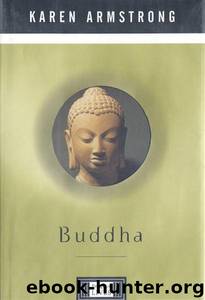Buddha by Karen Armstrong

Author:Karen Armstrong
Language: eng
Format: mobi, epub
Tags: Autobiography, General, Religion, Buddhism, Buddhism - General, Biography & Autobiography, Religious, Biography
ISBN: 9781439568682
Publisher: Paw Prints
Published: 2008-11-03T08:00:00+00:00
the flowering trees bloomed; the fruit trees were weighed down by the burden of their fruit; the trunk lotuses bloomed on the trunks of trees . . . The system of ten thousand worlds was like a bouquet of flowers sent whirling through the air.
The ocean lost its salty taste, the blind and the deaf were able to see and hear; cripples could walk and the fetters of prisoners fell to the ground. Everything suddenly glimpsed new freedom and potency; for a few moments, each form of life was able to become more fully itself.
But the new Buddha could not save the world vicariously. Every single creature would have to put Gotama’s program into practice to achieve its own enlightenment; he could not do it for them. Yet at first, it seemed that the Buddha, as we must now call Gotama, had decided against preaching the Dhamma that alone could save his fellow creatures. He would often be known as Sakyamuni, the Silent One from the republic of Sakka, because the knowledge he had acquired was ineffable and could not be described in words. Yet throughout the Ganges region, people were longing for a new spiritual vision, especially in the cities. This became clear, the Pali texts tell us, almost immediately after the Buddha’s enlightenment, when two passing merchants, called Tapussa and Bhalluka, who had been informed of the great event by one of the gods, came to the Buddha and paid homage to him. They became his first lay followers. Yet despite this initial success, the Buddha was still reluctant. His Dhamma was too difficult to explain, he told himself; the people would not be prepared to undergo the arduous yogic and moral disciplines that it required. Far from wishing to renounce their craving, most people positively relished their attachments and would not want to hear his message of self-abandonment. “If I taught the Dhamma,” the Buddha decided, “people would not understand it and that would be exhausting and disappointing for me.”
But then the god Brahma intervened; he had watched Gotama’s enlightenment with close attention, and was devastated to hear this decision. If the Buddha refused to teach his Dhamma, Brahma cried in dismay, “the world will be lost, the world will not have a chance!” He decided to intervene. The Pali texts introduce the gods into their narrative quite unselfconsciously. The gods were part of their universe, and these legends, which show Mara and Brahma contributing to the Buddha’s story, illustrate the tolerant partnership that would exist between the new religion of Buddhism and the older cults. Unlike the Hebrew prophets, who poured scorn on the rival deities of their pagan neighbors, the early Buddhists felt no need to stamp out the traditional worship still enjoyed by vast numbers of people. Instead, the Buddha is shown allowing the gods to help him at certain key moments of his life. Like Mara, Brahma may also have represented an aspect of the Buddha’s own personality. This was, perhaps, a way of suggesting that the gods were projections of subconscious human forces.
Download
This site does not store any files on its server. We only index and link to content provided by other sites. Please contact the content providers to delete copyright contents if any and email us, we'll remove relevant links or contents immediately.
| Military | Political |
| Presidents & Heads of State | Religious |
| Rich & Famous | Royalty |
| Social Activists |
Waking Up in Heaven: A True Story of Brokenness, Heaven, and Life Again by McVea Crystal & Tresniowski Alex(37794)
Empire of the Sikhs by Patwant Singh(23074)
We're Going to Need More Wine by Gabrielle Union(19036)
Hans Sturm: A Soldier's Odyssey on the Eastern Front by Gordon Williamson(18579)
Leonardo da Vinci by Walter Isaacson(13319)
The Radium Girls by Kate Moore(12019)
Tools of Titans by Timothy Ferriss(8369)
Educated by Tara Westover(8047)
How to Be a Bawse: A Guide to Conquering Life by Lilly Singh(7472)
Permanent Record by Edward Snowden(5839)
The Last Black Unicorn by Tiffany Haddish(5630)
The Rise and Fall of Senator Joe McCarthy by James Cross Giblin(5275)
Promise Me, Dad by Joe Biden(5146)
The Wind in My Hair by Masih Alinejad(5092)
A Higher Loyalty: Truth, Lies, and Leadership by James Comey(4954)
The Crown by Robert Lacey(4808)
The Iron Duke by The Iron Duke(4350)
Joan of Arc by Mary Gordon(4103)
Stalin by Stephen Kotkin(3958)
